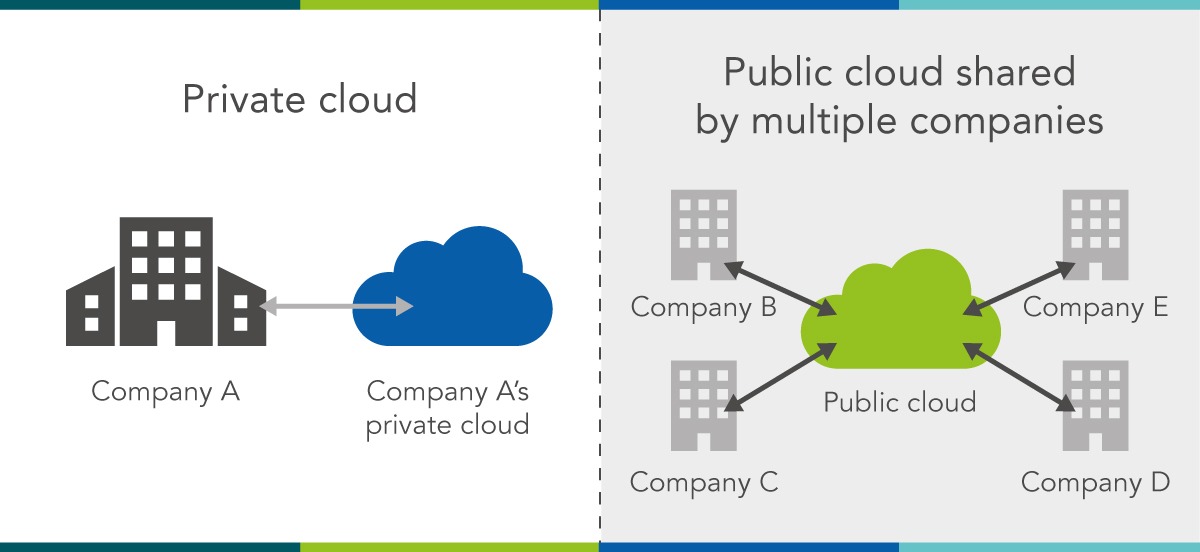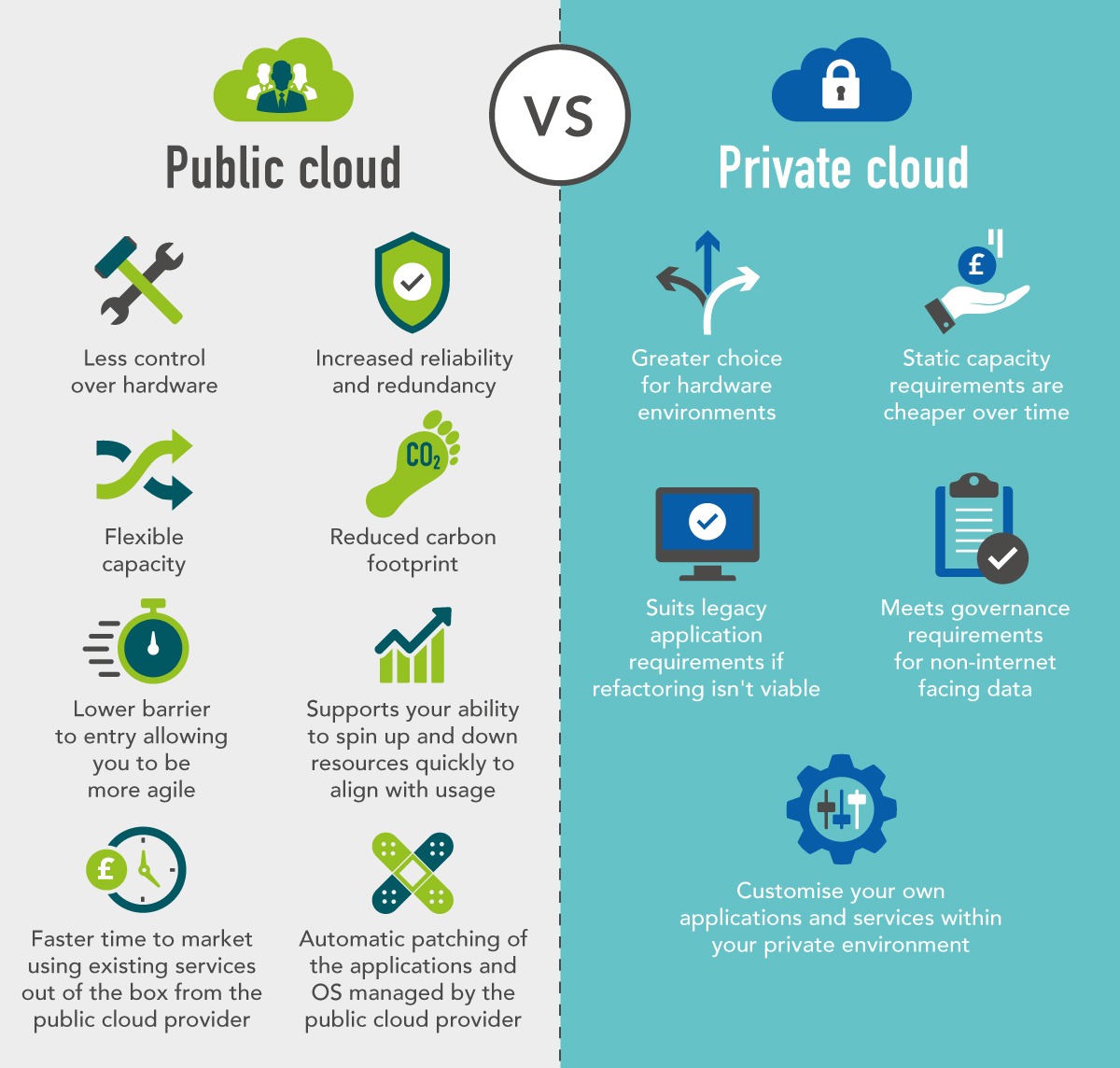Private cloud vs public cloud: What are the main differences?
Cloud computing is the storing or accessing of applications, systems, and data via the Internet instead of directly on your computer. It lets you access a broader variety of applications and systems such as email, data analytics, and other business applications.
But the cloud isn’t one thing: it spans a range of classifications, types, and architecture models – including, public cloud, private cloud, and hybrid cloud.
This article will compare public cloud vs private cloud, and explore the benefits and differences of each. That way, you’ll be able to decide which option works best for your situation!
The basics of cloud computing

In recent years, the use of cloud computing has exploded, with companies and people going beyond the original ‘Software as a Service’ (SaaS) applications into Platform as a Service (PaaS), Infrastructure as a Service (IaaS), and even Data Centre as a Service (DCaaS).
Fortunately, any of these cloud computing services can be set up as a public or private cloud option – so it’s up to you to choose which works best for your requirements.
Public cloud
A public cloud is typically stored on remote third-party infrastructure offered to multiple customers by a cloud provider, such as AWS or Microsoft Azure.
Each user is given authorised access to the public cloud to use the application or service, but each customer is securely isolated, so data isn’t shared – users only share the cloud provider’s infrastructure, bandwidth, and system resources as they use the service.
Private cloud
A private cloud is a cloud application or service not shared with any other organisation or customer.
It consists of cloud computing resources used exclusively by one business or organisation and can be physically located in the organisation’s on-site data centre or hosted by a third-party service provider. Even if hosted remotely by a third party, no other organisation has access to the private cloud.
The differences between public and private clouds
From available technologies to compliance, costs and scalability, there are many subtle differences between private and clouds.
Infrastructure
Both public and private clouds can run on remote hardware and IT infrastructure. Public clouds run on multi-tenant, shared infrastructure, and private clouds run on single-tenant architectures. A private cloud may also be located on-premise in a company’s data centre, while a public cloud will not.
Technology options
Another area to consider when choosing between private cloud vs public cloud is the availability of the latest and greatest technologies.
Public cloud users will always get access to the latest version of applications and systems, because the cloud providers pride themselves on ensuring they roll out the newest features and options.
On the other hand, private cloud customers will need to rely on their internal IT staff or their managed private cloud provider to stay updated on the latest offerings. Of course, internal teams may have other things to worry about and work on, so a private cloud may stay on older versions of applications for longer.
If this is a sticking point, it might be worth considering public over private cloud, to ensure you’re always receiving the best-in-class service.
Accessibility and security
A key difference between public vs private cloud is security and accessibility:
- Public clouds are accessible by authorised users via the internet
- Private clouds are only accessible by authorised users located within a company’s firewall or on their corporate network
Security on a private cloud can be controlled and monitored more closely, since your company has complete control over access and the infrastructure. In contrast, public clouds rely on security at various waypoints on the Internet and are more susceptible to attack. However, because they’re accessed via the internet, public clouds are typically more mobile-friendly.
Compliance
Since they’re located in and maintained by cloud providers, public clouds offer minimal technical control and visibility into their services.
This makes public clouds ideal for companies that use general cloud apps and services to perform IT and business operations. However, if your company operates in a highly regulated industry or deals with sensitive data and information, you may consider using a private rather than public cloud.
As opposed to the minimal technical control afforded to users of public cloud, private cloud offers more robust control, security, and visibility of IT infrastructure, so you can fine-tune security options as needed.
Plus, some security guidelines and laws worldwide require deep visibility into application options and data storage methods, so a private cloud offers more features to do so.
Bandwidth and connectivity
If strong, reliable connectivity is essential to your business operations, consider the bandwidth benefits of private vs public cloud:
- Public clouds depend on the public internet for bandwidth and connectivity performance, making it a good option for companies with predictable computing needs.
- Those who require consistent and highly reliable bandwidth and performance, should consider using a private cloud, since it only depends on the internal number of resources using it.
Incidentally, companies can also throttle the private cloud for high-availability time periods, to ensure high-priority workloads are completed as needed.
Costs (up-front and ongoing)
One of the main differences between public and private clouds is the initial cost:
- Public clouds offer flexible and cost-effective pay-as-you-go models that make it cheaper to get into the market.
- Private clouds have higher up-front costs as they typically require a large, up-front investment in IT infrastructure, resources, and maintenance.
The pay-as-you-go public cloud model helps companies reduce spending on hardware and on-premise infrastructure, since the cloud provider handles this portion of the workload. That includes passing along overhead maintenance tasks and costs to the provider since it’s on them to do it all.
Where the two can even out, though, is with the total cost of ownership (TCO.) Public cloud customers should generally have a lower TCO if they’ve paid attention to their seat usage and overage costs and renegotiated wisely come subscription renewal time. If the company expands rapidly without considering the public cloud costs, things can get just as expensive as a private cloud.
Scalability
Public clouds can scale up or down more easily than private clouds, because they have the necessary infrastructure and resources to do so efficiently – they’re set up to scale as needed and have the proper monitoring tools and IT staff to handle it at a moment’s notice.
Alternatively, a private cloud relies on the infrastructure and staff at hand, so if your company’s run out of bandwidth on the infrastructure you have, you’re stuck until you add more hardware.
Services
The applications and services available in the public cloud span every kind of cloud architecture, platform, and business need. With so many ‘-as-a-Service’ offerings out there, many companies using a public cloud will never have to own or buy infrastructure again.
But, if you’re in a highly regulated industry, are looking for more stringent control over your infrastructure, or have the money reserves to do it, a private cloud may be the option for you.
Hopefully, you should now feel confident about choosing public cloud vs private cloud, with the decision driven by your requirements, your industry, and how the cloud can help you achieve business goals.
For more help determining which option is right for you, reach out today. Our cloud consultancy service can guide you through each step of the process and help you find the right cloud strategy.



